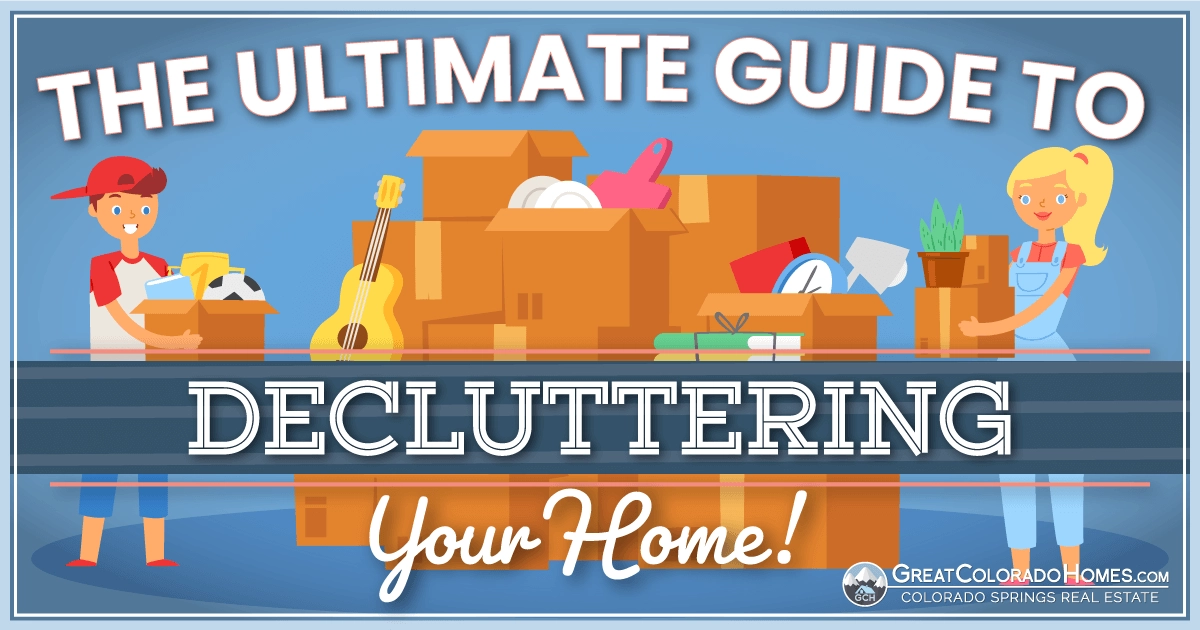Learning how to declutter your home can be liberating. Did you know that 80% of what we own, we never use? You keep things just in case you need them later. But later never comes, and the items get shoved to the back of a cupboard, never to be seen again.
Unnecessary clutter can be a source of stress that impacts many aspects of your life. Clutter and disorder in our lives can distract us, weigh us down, and promote chaos.
Addressing the clutter can seem like a daunting challenge if you don't know where to begin. By dedicating some of your time to disposing of the clutter and keeping things reasonably tidy, you will enjoy the benefits of orderly living space. This change will result in less stress, more organization, and productive living.
The easiest way to unclutter your house and your life is to take these things one step at a time. Eventually, every home could use some decluttering. However, with all that stuff, where do you even start? See this ultimate guide this the best tips to declutter your home.
How Can Decluttering My Home Benefit Me
It is very typical for a home to accumulate many things over time. Before long, every storage space, closet, and drawer is packed with stuff. These extra items may be causing you undue stress without you even knowing it. Let's discuss some of the unexpected health benefits that come from decluttering your home.
Decrease Stress and Anxiety
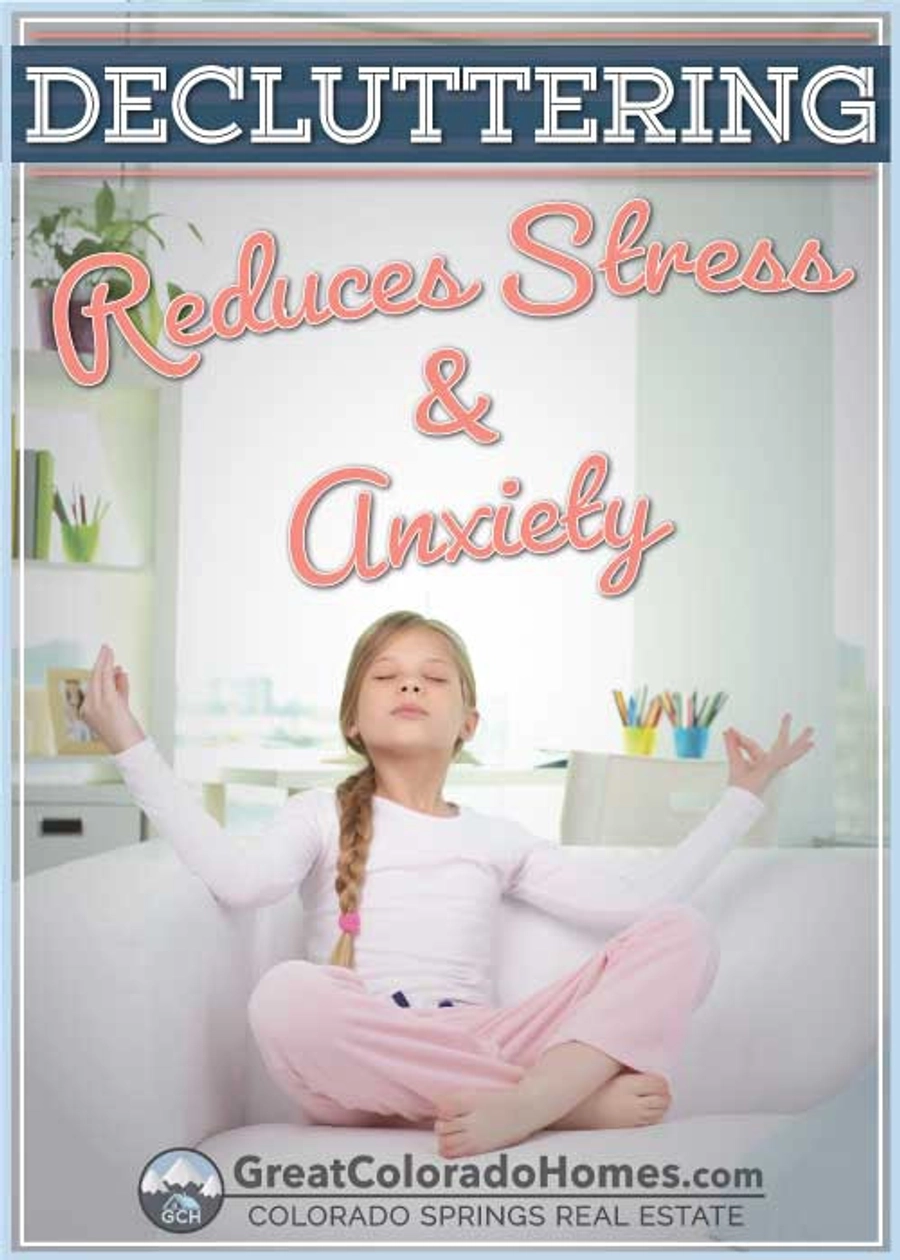 Depression and anxiety can lead to a cluttered home. A dirty home can make you feel depressed and anxious. It's a vicious cycle. When we are depressed, we tend to do less around the house, making the situation worse.
Depression and anxiety can lead to a cluttered home. A dirty home can make you feel depressed and anxious. It's a vicious cycle. When we are depressed, we tend to do less around the house, making the situation worse.
That can trigger anxiety, raise stress levels, and even make you feel guilty or ashamed about your home when visitors come around.
Start small by decluttering just one room at a time. Take note of how you feel when you have accomplished the uncluttering operation. You will feel much calmer, and you will feel good about yourself.
Help You Sleep Better
If you're engulfed by chaos, you may be able to overlook it, but your brain will still register it. Your brain will still subconsciously know that there is a basket of laundry spilling onto the floor, piles of books on a corner table, and unmatched socks lying about.
You will see that when you finally clear the clutter, your subconscious will be able to relax, thereby resulting in a good night's sleep.
Your bedroom should be a refuge for you to escape to at the end of the day, not another source of tension. We spend a total of one-third of our lives sleeping, so decluttering our bedrooms is a reasonable starting point.
If you have completed your bedroom decluttering and still can't sleep, then consider what else could be triggering your insomnia. The positive side is that you know it was not the clutter causing it in the first place, and you have ended up with a beautifully clean and tidy bedroom!
Increase Creativity and Productivity
Many people find it difficult to focus when engulfed by clutter, such as working on a messy, unorganized desk. Large amounts of stuff around you may make you feel overwhelmed and have a detrimental effect on your ability to concentrate.
Without all that clutter around you, you will soon see that your levels of concentration will increase.
Find Lost Treasures
If anything, spring cleaning your home is a way to refind all the 'lost' items you had lost or forgotten about.
Decluttering is a method that includes unpacking cupboards or boxes you have not touched for a long time, but are still packed to the gills with stuff you have forgotten you had. For so many people, this becomes a 'cleansing' of sorts. You can find items you had long forgotten, like photographs, old jewelry, and your first love letter.
That will definitely bring on good thoughts and lighten your mood.
Your Home Will Be Easier to Clean
 The fewer possessions you have, the more space you will have in your house. Once you have decluttered, you will end up with a clean, organized, and tidy home.
The fewer possessions you have, the more space you will have in your house. Once you have decluttered, you will end up with a clean, organized, and tidy home.
With less stuff in your home, it will be so much easier to clean. You will also save time as cleaning will take you no time at all! No fighting with clutter.
Clean Your Home of Allergens
All homes gather dust. That is a fact, no matter how much you clean!
Keeping the dust and pet hair from piling up, particularly if you are affected by allergies, will improve your health and quality of life. One of the ways to do this is to declutter your home.
Every single room should be addressed. From attic to basement, particularly those rooms you do not go into often.
Therefore, disposing of excessive clutter will help to boost the circulation of dust-free air in your house. Once your home is fresh, your family members will thank you.
Make Some Cash
One man's rubbish is another man's treasure! That is why people cannot identify what clutter is. If you have not used or touched an item for over six months, typically, this can be called clutter.
When decluttering a home, any unwanted items may be worth some cash. These can be sold either at a garage sale or online.
Recycling Feels Great
Taking items out of your home and recycling them feels much better than simply throwing them into a landfill. Setting up a recycling bin in your home can add peace of mind to your decluttering process as you empty your kitchen cabinets, laundry room, garage, and bedrooms.
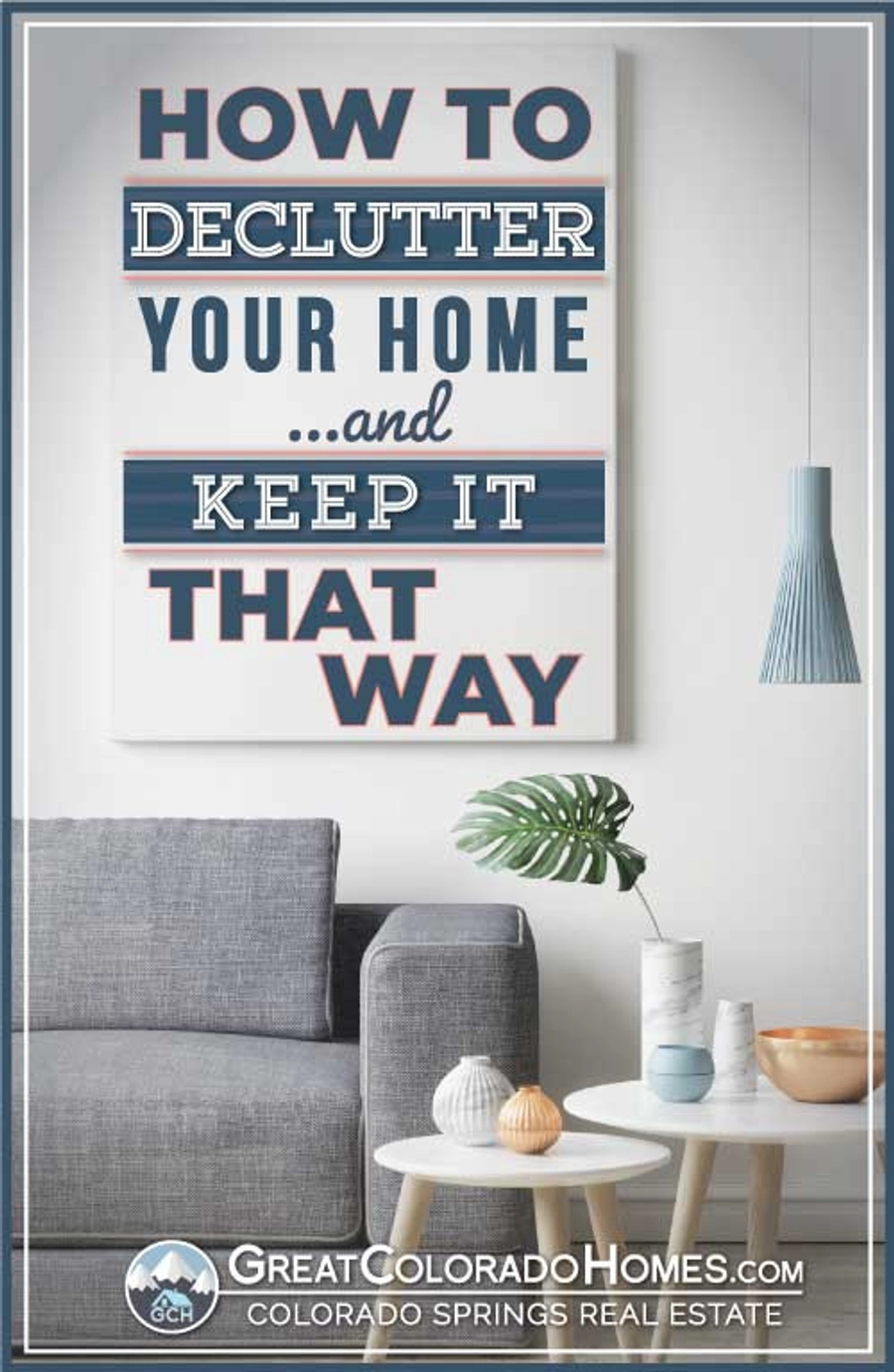 How to Declutter A House and Keep It That Way
How to Declutter A House and Keep It That Way
Having a clean home gives you peace of mind. Decluttering your home can be a challenging and daunting activity. The best advice is to take it one step at a time.
Here are some decluttering ideas to help you cope with the daunting task:
- Allocate an amount of time to concentrate on the task at hand, one little bit at a time.
- Empty everything off a shelf, drawer, or box, then give your attention to the pile and sort it piece by piece.
- Have a keep pile, a throw-away pile, and donate pile.
- Be ruthless. If you haven't used the item or worn that top in the last year, chuck it.
- Keep only important paperwork. You do not need that magazine you were keeping for, oh wait, I can't remember.
- If you are not sure about certain items, put them in a box labeled with a question mark. Store it and in a year later go through it again.
- Don't let your clutter grow again. If you don't need it or are finished with it, chuck it!
It can be very hard, but once you set a routine, before you know it, boom, it will be done!
Change Your Way of Thinking
Peter Walsh once said, "Clutter is not just the stuff on the floor; it's anything that stands between you and the life you want to be living!"
Take just a few steps forward and implement just a few mindsets and habits that will help you sustain your new clutter-free living.
Here are some mindsets to change to keep you going and maintain a clutter-free life:
1. Feeling Guilty
Guilt is probably one of the main obstacles stopping you from decluttering. We feel bad that we are getting rid of things, so we keep them.
If we hold onto things out of guilt, it produces a toxic atmosphere that does little good to our mindset. If you can let go of the guilt, it will change your attitude.
Don’t let sentiment get hold of you. It can be challenging to let go. Make a decision based on two questions to ask yourself about that particular sentimental item.
Will I forget what that meant to me if I throw the thing away?
If I give it to someone else, will it make me happier knowing it is being used?
2. Focus on What Is Enough
Decluttering and downsizing should not be thought of as having the least amount of stuff. You should focus on having the perfect amount of stuff.
What people consider the ideal amount of stuff for one is different from what another considers. Remember, having too little is just as bad as having too much.
3. What If I Need It Tomorrow?
We pick up an object that we want to throw on the declutter pile and then remember, 'What if I need it later?'.
This one question is undeniably the biggest contributor to keeping clutter.
You have to change your mind and believe you will substitute the item when you really and truly need it.
Don't expect to declutter your home overnight. Remember, it took a while to gather the clutter in the first place. Take it slow and easy.
How To Declutter: A Room-By-Room Guide
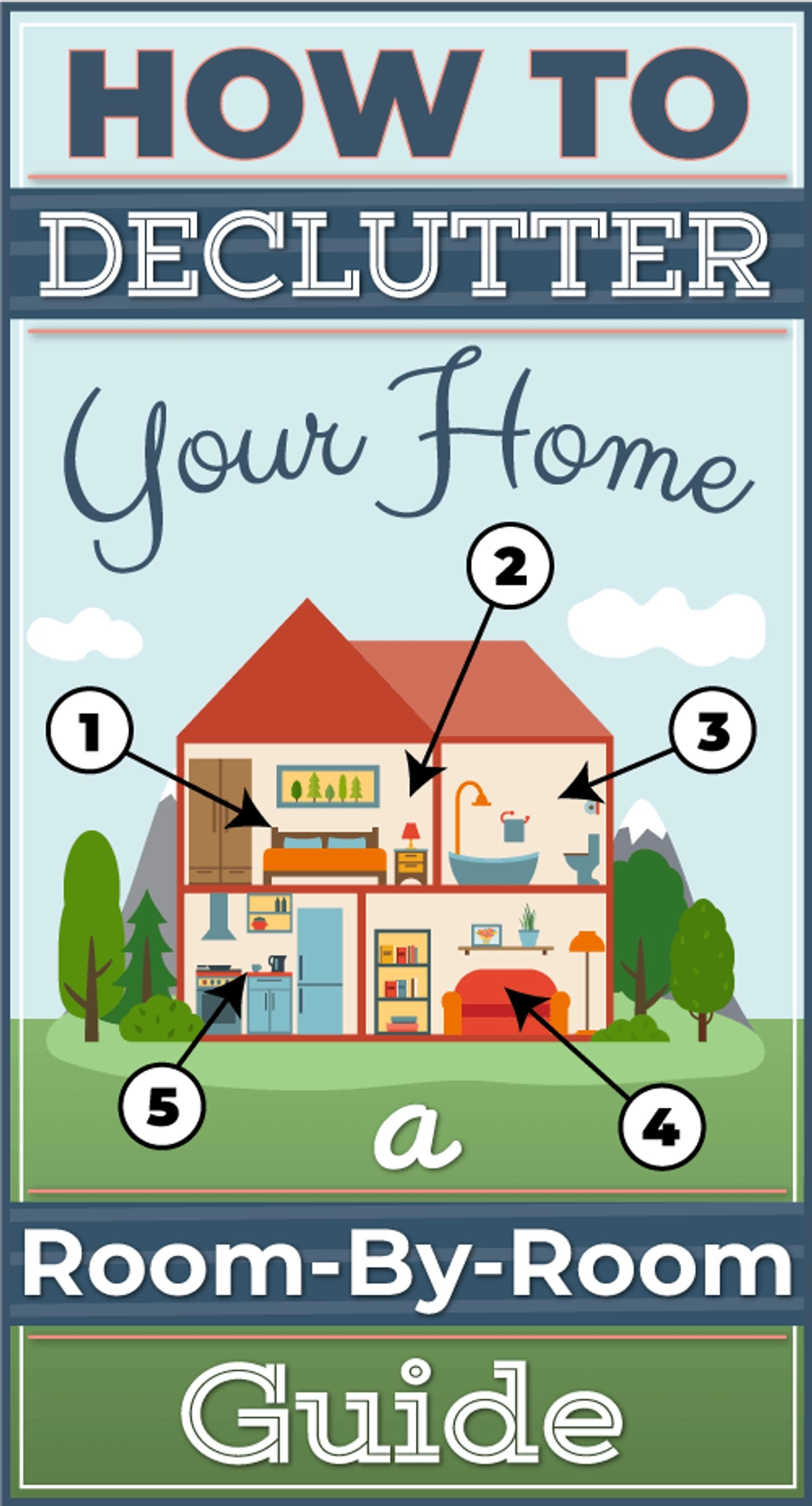 Because each room in your home is used for different things, it needs to be decluttered in different ways. Having an itemized to-do list for each room will help you get started decluttering your entire home. Let's go through each room and how to tackle each one of them.
Because each room in your home is used for different things, it needs to be decluttered in different ways. Having an itemized to-do list for each room will help you get started decluttering your entire home. Let's go through each room and how to tackle each one of them.
How To Declutter Bedrooms
Bedrooms also become cluttered with junk that does not belong anywhere else. You can get away with a bed, nightstands, and limited storage for shoes, jewelry, and makeup.
Drawers First
Empty all your drawers. Then, going through each item, asking the following:
- Does this item belong in my bedroom?
- Have I worn it or used it in the last year?
If you replied 'no' to any of those questions, throw it out or move it to where it belongs.
Once you have done that, start packing the items you are keeping back into the empty drawer. Use boxes and containers to store things that belong together.
Clear Surfaces
Having some stuff on flat surfaces, like a picture or two, a lamp, and a few decorations is okay. Try not to overcrowd it, though.
By keeping surfaces relatively clean and open, you will feel much better within yourself. Your bedroom is where you rest; therefore, it should feel clean and peaceful.
Use Storage Bins for Seasonal Clothing and Other Items
Seasonal clothing and linen can be stored either in bins or in space-saver plastic bags. These can then be stored under the bed, in the basement, or in the attic when it is time to use them.
Children's toys can also be stored in bins, chests, or baskets on the closet floor. If you do not have space for all the toys, perhaps you should donate the least-used ones.
How To Declutter Your Closets
There is a sort of calming effect when you declutter your closets. The process of going through your belongings works on your mind and lets you get rid of emotional baggage.
Every single one of us has said to ourselves, 'I'll keep that for when I lose weight, or for that special occasion?'. Right, then ten years go by, and you haven't touched it!
Remember to keep to your rule of three boxes: keep, throw, and store.
How To Declutter Clothes and Shoes
Generally, people only wear 20% of the clothing and shoes they own. In effect, then you have 80% of the stuff that could be gotten rid of. Do you have trouble deciding what to keep? Ask yourself the following questions for each item:
- Does it still fit me?
- Is it broken, torn, or old?
- Have I worn it in the last year?
If the answer is no to any of the above, you can put it in the 'throw-away' bin. Seasonal clothing and sentimental clothing (like a wedding dress) need to be put into storage to free up space.
Even after you have done this exercise, you will find that you will still end up with items you should not have kept. It is only human. Each time you do a declutter, you will find it easier and easier over time.
Decluttering Your Living Room
The living room is the focus of the home. That is where the family relaxes together. If the room is untidy and full of clutter, it can be a pain to unwind.
The following steps will help you on the road to a clutter-free living space, where your family can get together and relax.
Dump Junk, Dispose of Unneeded Items
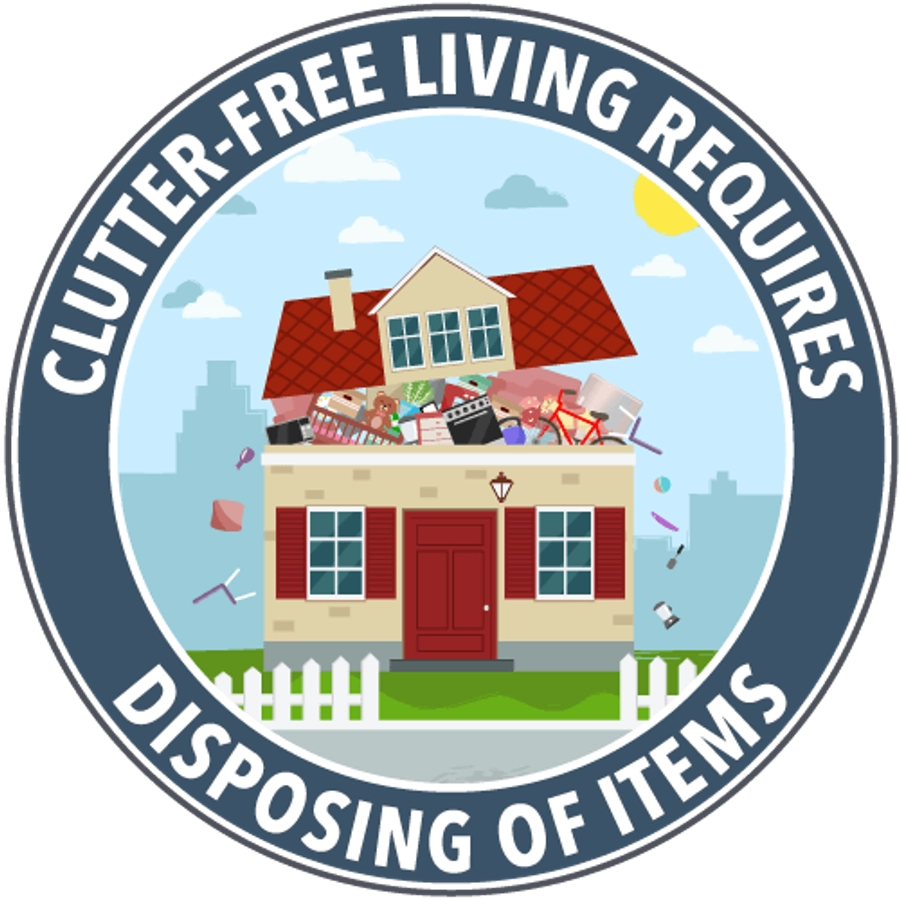 Because the living room is the room with the most traffic, it's easy to accumulate junk.
Because the living room is the room with the most traffic, it's easy to accumulate junk.
Take a look around. Do you have too many books, collectibles, and pictures strewn on your tabletops?
The first step is to go through these and keep the more sentimental ones. Perhaps add some more wall shelving to lift the collectibles. Hang pictures rather than display them on top of surfaces. Basically, downsize.
Because the living room is the most used in the house, you will find many things find their way into this area, like toys, mail, magazines, glasses, and dishes. Start by removing these items to where they belong. Toss away old magazines.
Go through your bookcase. There may be books, CDs, and DVDs in there that have not been touched over the years and are taking up space.
With today's technology, these items could be converted into audio files on your computer. That is the best of both worlds. You still get to keep your books, CDs, and DVDs, and you get more space.
More Storage Space
When decluttering, you can find yourself with an excessive amount of things that do not belong in the living room. Here are some ideas to store these, which will help keep your living room neat and tidy:
- The most obvious is to add shelving. These could be categorized into one shelf to be used for board games, another for music, and so forth.
- Toys and general items could be stored in baskets and containers. Also, keep toys together, etc.
- Look for furniture that can double up as storage: chests and sofas with false bottoms. You could store the things you need in these spaces.
Tidy Your Home Office
Home offices are notoriously cluttered spaces. They're filled with supplies that are not used or supplies that will last us forever. It's the most common space to dump all that paperwork you promised yourself you would organize and file later.
It would be best if you always had an in-tray and an out-tray on a surface near the office door or on the desk itself. This way, it will be easier to immediately see what you have to deal with instead of sifting through mountains of paperwork.
Sort Your Paperwork
There is workplace clutter in any home, even though you may not have a home office. We all have important documents to store, letters to answer, and, worst of all, bills to pay. Cleaning up and sorting out this paper nightmare will put your mind at ease.
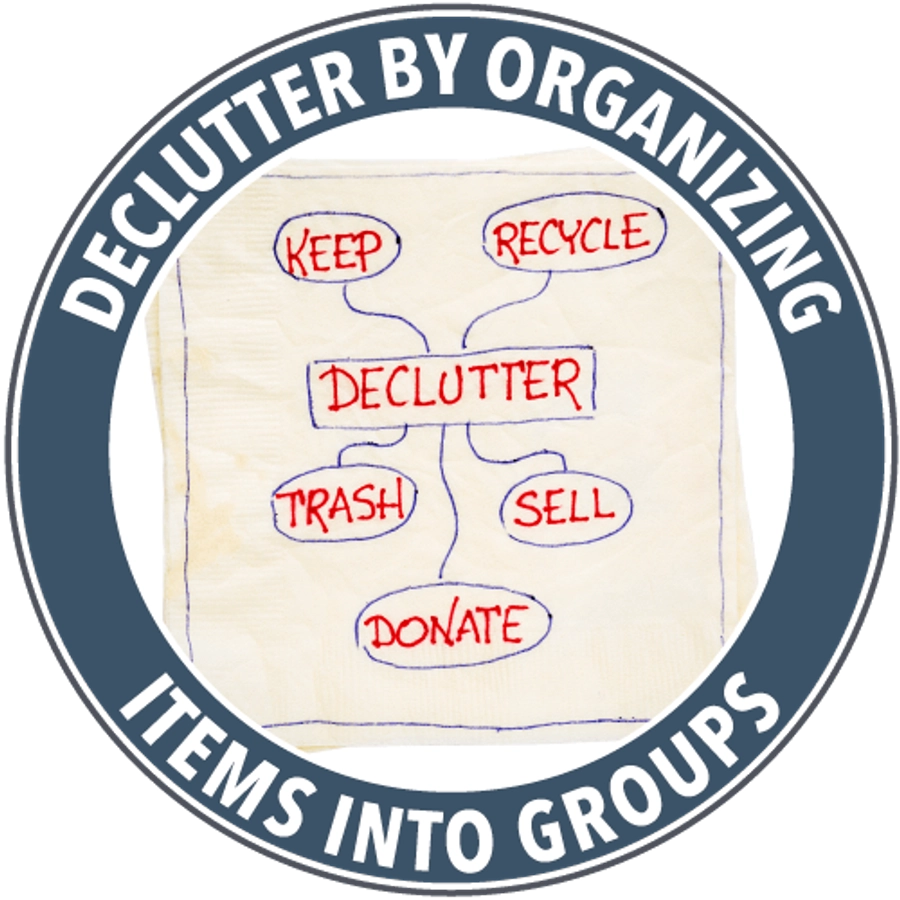 When going through your paperwork, have three piles:
When going through your paperwork, have three piles:
- File
- To-Do
- Trash
Once you have sorted through it, immediately attend to the filing pile. The to-do pile goes into a tray to attend to later, once you have finished the office's declutter. The third pile is the easiest one to deal with. This pile should go into trash bags and be thrown out!
Here are some other decluttering ideas for your paperwork:
- Make digital copies of important documents and receipts. Then throw the original away if you do not need to hang onto it.
- Store necessary older paperwork in plastic bins.
- Put important 'deal with immediately' paperwork in a separate tray so that you can deal with them urgently. This way, you do not have to scratch around to find that document.
Clear Your Desktop and Organize Your Drawers
Don't overcrowd your desktop. You should only have your computer, a lamp, and items used daily on your desk. The rest should be tucked away in a drawer.
Your office supplies and stationery should be stored neatly away in your drawers or on shelving. Bunch like-things together. Things like pens and pencils could be stored in a drawer organizer, with only some essentials on the desktop.
John Rampton, named one of the top influencers in the world by Entrepreneur Magazine, quoted, "You may think having a cluttered desk is not that a big deal. But that could not be further from the truth. Disorganization can stunt your work growth and decrease productivity."
Some office managers hire professional organizers to help keep their offices clean and organized. This saves time and helps keep their productivity higher than average.
Get Your Kitchen to Work Efficiently
The kitchen is on a par with the living room when it comes to foot traffic. It is by far the most packed of all the rooms. With dinnerware, cookware, utensils, appliances, tinned goods, spices, and dry foods, the list goes on and on.
And some areas where clutter can build up are cabinets, drawers, and countertops.
The First Step Is Decluttering Countertops
Decluttering the kitchen is an excellent start to decluttering the home. Start with these two steps:
- Remove all unnecessary items from counters and leave only essential ones.
- Sort through the stuff you have taken off the counter. Throw out empty spice bottles, jam jars, and paper. The items you have decided to keep are put in a box to pack away later.
This first phase will make it feel like you have a brand new kitchen.
Break up the Kitchen Into Areas
It will be much easier and not as messy if you break the kitchen into areas and declutter each space separately. Let's make sense of this.
- It goes without saying that cooking utensils, pans, and pots need to be near the stove.
- As you usually do not bake every day, baking utensils can be put away in a cupboard or shelf.
- Tinned food should be stored together. Check for expiration dates and throw away if they are out of date, as with dry foodstuffs. If you have open packets of dry foods, store them in labeled plastic containers or bags.
- Cling wrap, aluminum foil, and storage bags should have their own space, as should cleaning materials.
- Go through your small appliances. Get rid of those you have not used in a year. Also, store any double appliances in a plastic container, if you so wish. Appliances that have many functions in one, like a food processor, are a keeper.
- We all know that cupboard that you cringe to open as all the plastic containers come tumbling out. Strip all the boxes from the cupboard—match lids with bottoms. Throw away any tops and bottoms that do not match.
- Another nightmare is the pots and pans cupboard. You should keep a set of pots and pans that you use daily. No need to have five of one and three of another. Unless it is a special pot, like a pressure cooker, throw out your duplicates.
- Unclutter kitchen drawers. Again, keep one of each of the utensils and get rid of any surplus items.
Simplicity is the key to an unencumbered life.
How to Declutter Your Bathrooms
This room is one of the most straightforward rooms to declutter. It would be best if you cleaned up any mess on your worktops, shelves, and drawers. Once you have done this, you will see how much you have essential bathroom goodies.
Empty and Restock
Clear off your bathroom cabinets and empty drawers. You may find that you have found enough shampoo for the rest of the year!
Don't hold onto bottles of products with that little bit left. Either use it next time you are in the bathroom or throw it away. Again, don't keep that bath ball Aunt Imelda gave you three Christmases ago because you feel guilty.
Put Like-Things Together
Once you have all the things you've decided to keep, group them into sections. For example, shampoo and conditioners together, soaps together, and toiletries together. You get the picture!
Go through your medicine cabinet. Weed out out-of-date medication and empty bottles.
Set Up Organization Systems
Bathroom organization is easy. Use organizers, plastic boxes, or baskets to store your basics.
Small things tend to gather in the bathroom, so it's essential to keep anything within easy reach and organized.
Keeping bathroom countertops clear is a goal similar to that of other areas in the home. If you regularly use the same items, you can arrange them in an easily accessible cabinet or shelf.
Clearing Your Basement or Attic
These are the 'forgotten' areas of your home. Out of sight, out of mind definitely applies to these areas. There are stories of people moving into a home and finding the previous owners' possessions still stored in the Attic.
Divide the Basement or Attic Into Areas
Divide the rooms into four areas and attack each area at a time. It will be much easier, and you will see results quicker.
Clear out the shelves, boxes, and containers, but do not move on to another area before you have finished one. You will find yourself chasing your own tail.
Again, use the three-box process: 'keep,' 'throw,' and 'maybe' bins.
If you find any broken items, put them in a box labeled 'to fix' and give yourself a deadline. If you haven't done it within that time, throw them away.
Group Objects That Belong Together And Throw Out the Rubbish
Don't just pack the items willy-nilly into any box. Group the things you are keeping together. For example, outdoor goods, kitchen goods, photographs, etc. That will make it easier for you if you want it later.
As you pack away into boxes, make sure you label these boxes correctly. Alternatively, store stuff in see-through plastic containers for easy visibility.
Clear Your Garage
The garage can collect a lot of junk, from old bikes to old tools, sporting equipment, and of course, that old gym equipment you were going to use ten years ago! Decluttering the garage area takes more time and effort. However, it is totally possible.
Who knows, you may even be able to use the garage for what it is intended: parking the car!
Empty the Contents of Your Garage
It's necessary to take every single piece out of the garage and sort through them to be able to find where you stand.
When you go through the items in your garage, group them. Then, get rid of the things you don't plan on using in the next two to four years.
Either sell these items or give or donate them to a charity. Rather, let somebody use them instead of letting them deteriorate in your garage.
Throw out any damaged goods if you have not looked at them to fix them in the last two years. Let's face it: You haven't touched it in the last two years!
Sort Through and Categorize Your Items
Once you've determined what you want to keep and what you would like to throw out, group and store items together, like sports equipment, gardening tools, machinery, Christmas decorations, camping gear, and gym equipment.
You will be happy you did this when you need a specific item. That way, it will be much easier to retrieve anything you need at a later stage.
Add Storage and Organization Systems
A garage is not an ideal storage solution, but it’s the most common. It would be good to buy more storage bins, a tool cabinet, or even a pegboard for hanging stuff. This will make your space feel large and open.
Sturdy shelving for a garage would also add space for storing tools and storage bins. You could install storage hooks in the garage walls for such things as hanging your bicycle, garden tools, hose pipes, and electrical extension leads.
Don't Let the Clutter Return.
There is a feeling of being alive and a breath of fresh air hiding behind a cluttered home. It's up to you to take the bull by the horns and declutter to find that freedom!
Now you know how to declutter your home. Making a change requires that first step; sometimes, that is the hardest part. Try decluttering one small space in the home at a time, and before you know it, voila! It may take up to 30 days to get your declutter project complete, so be patient.
When you are finished, feel the peace, the sense of fulfillment, and pride course through you.
You don't get a second chance to make a first impression! A neat and tidy, decluttered home will make an everlasting impression.
.png)
.png)

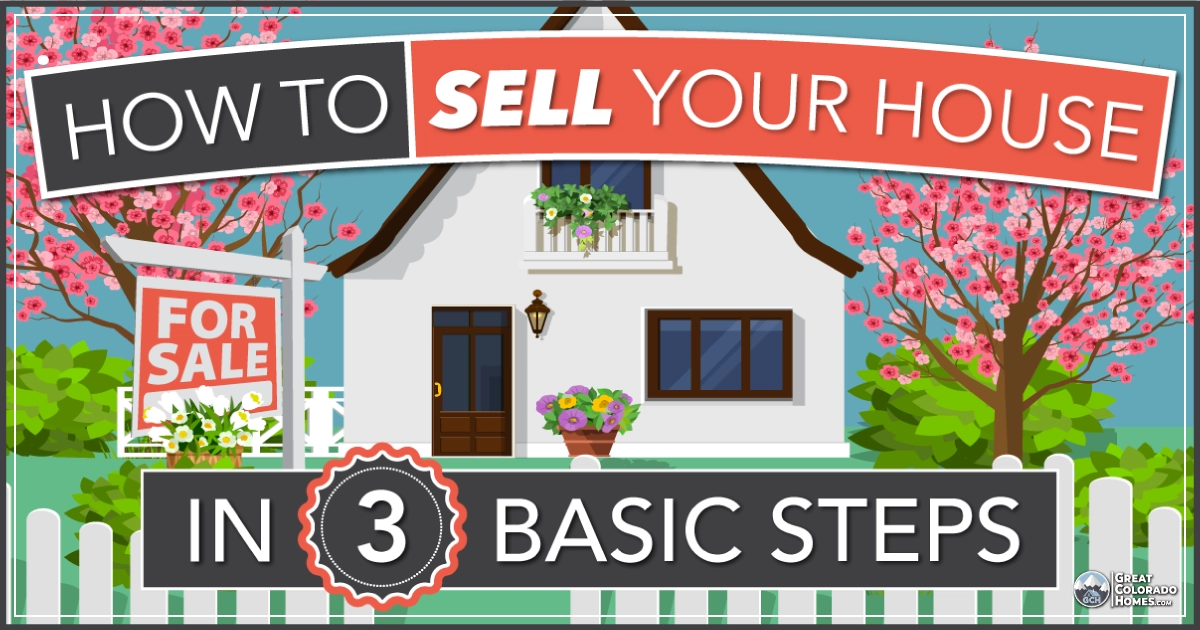

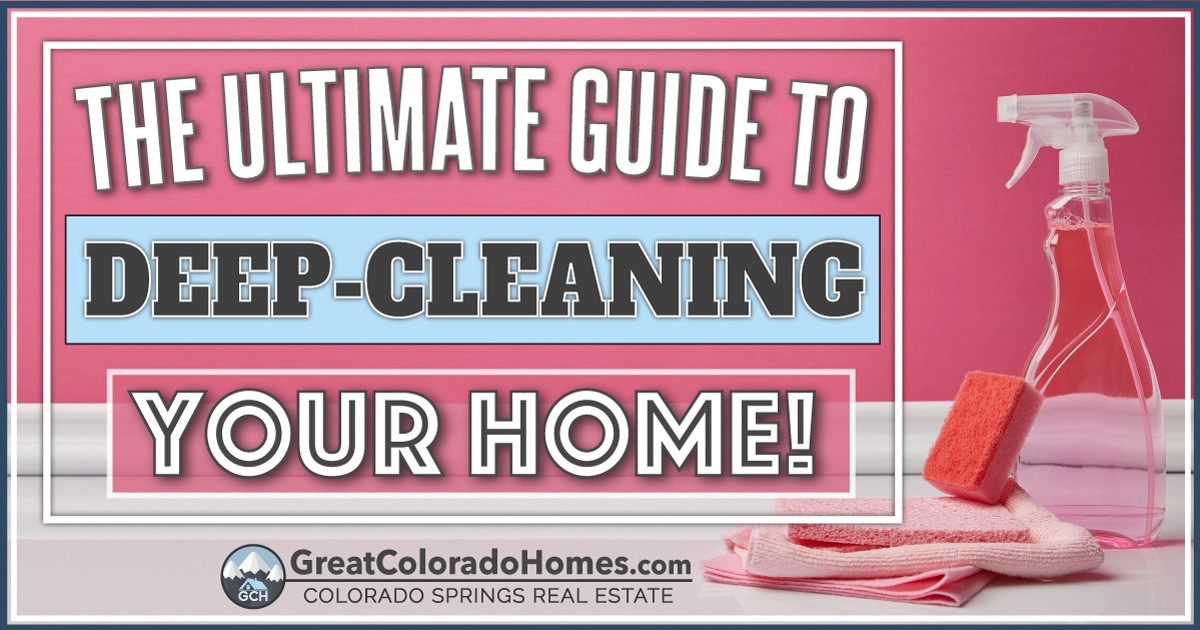







.png)
